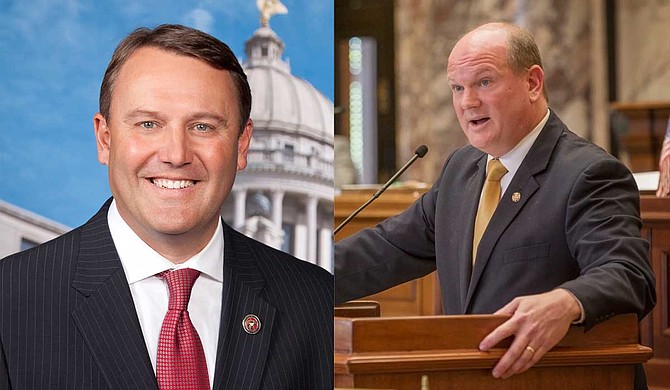Republican Rep. Jason White (left) seeks to divert mentally ill people away from criminal court, would stop suspending driver's licenses in some cases and allow people to wipe more crimes from their record. Senate Bill 2927, sponsored by Pascagoula Republican Brice Wiggins (right), would tackle a much more ambitious set of reforms. Photo courtesy MS House of Representatives/Imani Khayyam Photo by MS House of Representatives/Imani Khayyam
JACKSON, Miss. (AP) — Lawmakers in Mississippi's House are proposing modest steps to ease penalties on some people accused or convicted of crimes, but some senators seek much broader changes.
Republican Rep. Jason White of West on Wednesday discussed House Bill 1352 in a hearing before the House Judiciary B committee. The measure seeks to divert mentally ill people away from criminal court, would stop suspending driver's licenses in some cases and allow people to wipe more crimes from their record.
"Though these are meaningful steps, maybe they are baby steps in this reform," White said. "And maybe that's where we need to be."
But a measure in the other chamber, Senate Bill 2927 sponsored by Pascagoula Republican Brice Wiggins, would tackle a much more ambitious set of reforms. White said he considered many of those proposals for his bill, but concluded that they would stir too much political opposition from prosecutors and others.
For example, Wiggins' bill would downgrade first and second drug possession charges that are now felonies to misdemeanors. It would cut the maximum length of time that someone could be supervised on parole or probation to two years from the current five. And it would change Mississippi's habitual offender law so people with more than 10 years between crimes wouldn't face extended prison terms that now apply to anyone convicted of three felonies over their lifetime.
Political leaders including Gov. Phil Bryant and House Speaker Philip Gunn are putting an emphasis on further changes to Mississippi's sentencing laws and how the state treats people leaving prison to make punishment less harsh and make people less likely to commit new crimes.
Both measures seek to use Mississippi's existing drug court system to begin providing ways for people ill to avoid long jail stays and criminal convictions for actions that may result from mental illness. The House would begin calling the courts intervention courts and also divert military veterans who may have committed acts related to post-traumatic stress disorder to those courts.
Both bills would also bar the state from revoking someone's driver's license just because they didn't pay fines. The state would also no longer pull someone's driver's license for a drug charge not related to operating a vehicle.
The measures would widen the range of crimes that someone could have expunged from their records. Right now, for example, someone can wipe out only one felony, but both measures would allow someone to expunge a group of crimes committed together. For example, someone who crashes a car into property while drunk could seek to expunge both a DUI and a destruction of property charge. Someone who wrote multiple bad checks in one spree might be able to wipe all those charges out.
Even the House bill could face opposition, though. During Wednesday's hearing, for example, Republican Rep. Stacey Wilkes of Picayune questioned both the decision to let people with drug convictions keep their driver's license and to expunge more crimes, citing the instance of an employer hiring someone who had expunged an embezzlement conviction.
"You're going to expunge someone's records and I don't know that they've stolen money and I'm going to put them around money?" Wilkes asked.
Copyright Associated Press. All rights reserved. This material may not be published, broadcast, rewritten, or redistributed.
More like this story
- Lawmakers Debate Multiple Felony Expungement for Nonviolent Offenders
- Bryant: GOP Would've 'Hollered' If Obama Pushed Criminal Reform
- Reforming Criminal Justice: Is Mississippi Making Progress?
- Saving Tax Dollars with Re-entry and Rehabilitation
- Legislative Update: Tort Reform, Heartbeat Bills, Teacher Pay Moves Forward



Comments
Use the comment form below to begin a discussion about this content.